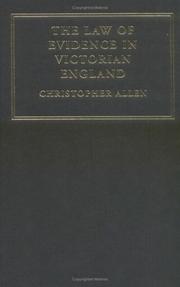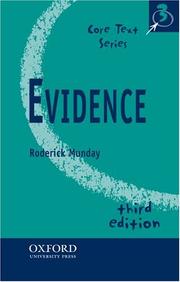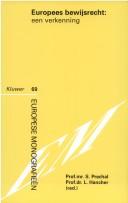| Listing 1 - 10 of 81 | << page >> |
Sort by
|

ISBN: 0521584183 Year: 1997 Publisher: Cambridge Cambridge University press
Abstract | Keywords | Export | Availability | Bookmark
 Loading...
Loading...Choose an application
- Reference Manager
- EndNote
- RefWorks (Direct export to RefWorks)
Evidence (Law) --- -Extrinsic evidence --- Parol evidence --- Trial evidence --- Actions and defenses --- Judicial process --- Trial practice --- Estoppel --- History --- History. --- -History --- Extrinsic evidence
Book
ISBN: 0748698175 1845861736 9780748698172 9781845861353 1845861353 9781845861735 9781845861735 Year: 2012 Publisher: Dundee
Abstract | Keywords | Export | Availability | Bookmark
 Loading...
Loading...Choose an application
- Reference Manager
- EndNote
- RefWorks (Direct export to RefWorks)
Evidence Essentials, now in its third edition, is an invaluable study guide for students. It provides up-to-date, concise and comprehensive coverage of the law of evidence in Scotland and is the ideal text for students who come new to the subject and for those preparing for exams. This book is also an excellent resource for those who need to refresh or update their knowledge. Summary sections of Essential Facts and Essential Cases will help students to identify, understand and remember the key elements of the subject.
Evidence (Law) --- Extrinsic evidence --- Parol evidence --- Trial evidence --- Actions and defenses --- Judicial process --- Trial practice --- Estoppel
Book
ISBN: 1474412017 9781474412018 9781474411998 1474411991 9781474412001 1474412009 9781474412025 1474412025 Year: 2019 Publisher: Edinburgh : Edinburgh University Press,
Abstract | Keywords | Export | Availability | Bookmark
 Loading...
Loading...Choose an application
- Reference Manager
- EndNote
- RefWorks (Direct export to RefWorks)
Why does Scotland have the evidence laws it does? This is the first textbook to set the Scots law of evidence against a modern backdrop of legal thought and empirical research. It examines the non-legal dimensions of evidence and proof through the lens of legal philosophy, procedure, sociology, science and psychology to analyse the contexts that affect the handling of facts and the process of proof in Scotland. Drawing extensively on socio-legal research, the book provides an accurate picture of how fact-finding works in Scotland – giving students the foundation for a complete, critical and contextual understanding of Scots evidence law.Key FeaturesDetailed, discursive and clearly written: designed for use on LLB evidence law courses in Scotland and by postgraduate students and researchers in the socio-legal contexts of the legal processExamines the philosophical, procedural, sociological, scientific and psychological factors that influence the Scots law of evidenceShows how these factors affect the purported aims of legal fact-finding: to ascertain truth and ensure justice through dealing rationally with evidence and proof
Evidence (Law) --- Extrinsic evidence --- Parol evidence --- Trial evidence --- Actions and defenses --- Judicial process --- Trial practice --- Estoppel
Book
ISBN: 1009032046 1009037293 1316516997 1009036955 Year: 2022 Publisher: Cambridge, United Kingdom ; New York, NY : Cambridge University Press,
Abstract | Keywords | Export | Availability | Bookmark
 Loading...
Loading...Choose an application
- Reference Manager
- EndNote
- RefWorks (Direct export to RefWorks)
This book offers a transnational perspective of evidentiary problems, drawing on insights from different systems and legal traditions. It avoids the isolated manner of analyzing evidence and proof within each Common Law and Civil Law tradition. Instead, it features contributions from leading authors in the evidentiary field from a variety of jurisdictions and offers an overview of essential topics that are of both theoretical and practical interest. The collection examines evidence not only as a transnational field, but in a cross-disciplinary context. Each chapter engages with the interdisciplinary themes cutting through the issues discussed, benefiting from the expertise and experience of their diverse authors.
Evidence (Law) --- Actions and defenses --- Judicial process --- Trial practice --- Estoppel --- Extrinsic evidence --- Parol evidence --- Trial evidence

ISBN: 0199285101 9780199285105 Year: 2005 Publisher: Oxford: Oxford university press,
Abstract | Keywords | Export | Availability | Bookmark
 Loading...
Loading...Choose an application
- Reference Manager
- EndNote
- RefWorks (Direct export to RefWorks)
Evidence (Law) --- Extrinsic evidence --- Parol evidence --- Trial evidence --- Actions and defenses --- Judicial process --- Trial practice --- Estoppel --- Evidence (Law) - England.
Book
ISBN: 9780198848486 019884848X Year: 2020 Publisher: Oxford : Oxford University Press,
Abstract | Keywords | Export | Availability | Bookmark
 Loading...
Loading...Choose an application
- Reference Manager
- EndNote
- RefWorks (Direct export to RefWorks)
'The Modern Law of Evidence' is essential for students studying the contemporary law of evidence. It examines the theory behind the law of evidence as well as its practical application, with emphasis on current debates.
Evidence (Law) --- Extrinsic evidence --- Parol evidence --- Trial evidence --- Actions and defenses --- Judicial process --- Trial practice --- Estoppel --- Preuve (droit)
Book
ISBN: 1108667325 1108602843 1108497284 1108739717 1108758282 Year: 2019 Publisher: Cambridge : Cambridge University Press,
Abstract | Keywords | Export | Availability | Bookmark
 Loading...
Loading...Choose an application
- Reference Manager
- EndNote
- RefWorks (Direct export to RefWorks)
Judges were never bound by law to convict a defendant unless they considered him guilty. Yet, they could be prohibited by law from convicting a person they consider guilty due to the absence of legally prescribed or the presence of legally prohibited evidence. Evaluation of Evidence addresses the question: should the law restrict the freedom of judges in assessing the probative value of evidence in the criminal process? Tracing the treatment of evidence from pre-modern to modern times, Mirjan Damaška argues that there has always been some understanding about rules regarding the use and treatment of evidence, and these rules should not be looked askance as a departure from ideal arrangements. In a time when science and technology have the ability to contribute to factual inquiry, there needs to be acceptance of rules that expand or corroborate evidence produced by our native sensory apparatus.
Evidence (Law) --- LAW / Evidence. --- Extrinsic evidence --- Parol evidence --- Trial evidence --- Actions and defenses --- Judicial process --- Trial practice --- Estoppel
Book
ISBN: 3030838412 3030838404 Year: 2022 Publisher: Cham, Switzerland : Springer International Publishing,
Abstract | Keywords | Export | Availability | Bookmark
 Loading...
Loading...Choose an application
- Reference Manager
- EndNote
- RefWorks (Direct export to RefWorks)
Evidence (Law) --- Extrinsic evidence --- Parol evidence --- Trial evidence --- Actions and defenses --- Judicial process --- Trial practice --- Estoppel --- Philosophy.

Abstract | Keywords | Export | Availability | Bookmark
 Loading...
Loading...Choose an application
- Reference Manager
- EndNote
- RefWorks (Direct export to RefWorks)
Law of civil procedure --- European law --- Evidence (Law) --- -341.17 EUR --- Extrinsic evidence --- Parol evidence --- Trial evidence --- Actions and defenses --- Judicial process --- Trial practice --- Estoppel --- 341.17 EUR
Periodical
Abstract | Keywords | Export | Availability | Bookmark
 Loading...
Loading...Choose an application
- Reference Manager
- EndNote
- RefWorks (Direct export to RefWorks)
Evidence (Law) --- Extrinsic evidence --- Parol evidence --- Trial evidence --- Actions and defenses --- Judicial process --- Trial practice --- Estoppel --- Law, General & Comparative --- Preuve (Droit)
| Listing 1 - 10 of 81 | << page >> |
Sort by
|

 Search
Search Feedback
Feedback About UniCat
About UniCat  Help
Help News
News